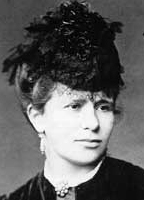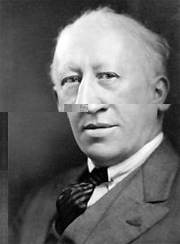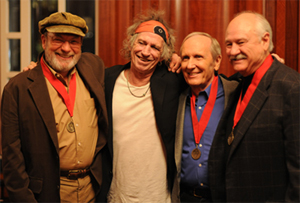A Philosopher, Humanitarian, and Musician: Albert Schweitzer
Albert Schweitzer (1875-1965), one of the exemplary inspirational figures of the early and middle decades of the 20thcentury, founded in 1913 and (with brief interruptions) for decades thereafter managed, a hospital in Lambaréné in the Central African rainforest, in the territory of what in 1960 became the independent nation of Gabon.
Yet Schweitzer was more than a humanitarian and physician. He was a distinguished scholar in both philosophy and theology. He coined the phrase “reverence for life” as his central philosophical principle and he regarded the hospital as only one expression thereof. Separately, his works on the early inspiration and development of Christianity continue to be studied and actively debated by the learned and pious a full century after the publication of the earliest example thereof.
 Loaded a life’s work though all that might seem, Schweitzer was more: he was a talented organist, and a distinguished musicological scholar. It is here, of course, that he most piques the interest of JSM.
Loaded a life’s work though all that might seem, Schweitzer was more: he was a talented organist, and a distinguished musicological scholar. It is here, of course, that he most piques the interest of JSM.
As a young man, in the 1890s, Schweitzer studied under the renowned French pianist and composer Marie Jaell.She had a theory, and she was confirmed in this by a physiologist with whom she had consulted, that if the mind holds before it a note or a musical phrase,

Marie Jaell
and the nervous system is normal and healthy, the natural instinct of the finger will be to do what is right to make that note or phrase. This theory led her to look for voluntary guinea pigs for some rather unusual training – aimed not so much at teaching technique as at the release of inhibitions that she believed otherwise impede the correct instinctive action. Schweitzer offered himself as one of these guinea pigs.
But he also hedged his bets. As the author of a fine biography of Schweitzer, James Brabazon, explains, Schweitzer studied with Marie Jaell at the same time as he was also studying with a more conventional piano pedagogue, J. Philipp. Since each mistrusted the other, he never told Philipp that he was studying with Jaell, or Jaell that he was studying with Philipp.
Gratitude
In later years, Schweitzer expressed his gratitude toward both his teachers. He said that Jaell helped him become “more and more completely master of my finger, with great benefit to my organ playing,” but he also said that Philip helped protect him “from what was one-sided in the Jaell method.”
In 1905 the publisher Breitkopf & Hartel brought out the first of Schweitzer’s writings on the music of J.S. Bach, a French language study, J. S. Bach: Le Musicien-Poète. It is pleasant to report that Breitkopf is still around, and now bills itself as “the world’s oldest music publishing company.”

Ernest Newman
Schweitzer’s book was an immediate hit, and there was an instant demand for a German translation. But Schweitzer, instead of a translation, produced a complete and more thorough re-working of the material in German, and these two volumes, J.S. Bach, were later (1908) translated into English by Ernest Newman, the renowned British music critic.
In 1906, Schweitzer wrote a pamphlet on the art of building an organ, in which he argued that romanticism in music had had a deleterious effect on that art, and that the real test of any organ is whether it is fit to play the works of Bach.
Specifically, Schweitzer preferred the creation of music through mechanical action to the use of comparatively new-fangled pneumatic action. “It is true,” he wrote, “that the mechanical action costs a good deal more than the pneumatic, but it is better to dispense with one or two stops and have the mechanical action.”
That is part of our way back, he wrote, to “an organ that is rich and beautiful in tone and interpretation.”
In 1913, when Schweitzer left Europe for Africa, the Paris Bach Society gave him, as a going-away present, no doubt as its own show of gratitude, a piano especially equipped with a pedal attachment that would allow Schweitzer to simulate the playing of an organ. A Mr. Ottman counseled him on how to preserve this piano/organ in the midst of central Africa, where voracious insects might otherwise have made a meal of it: he lined it with zinc.
He did get back to Europe now and then, especially in the years between the two world wars. In 1935-36, Schweitzer was in England, and at this time he made 78 rpm recordings of Bach’s works.  For the younger of our readers, we may as well specify that “RPMs” are revolutions per minute. Music was once recording by the cutting of grooves on a wax or vinyl platter.
For the younger of our readers, we may as well specify that “RPMs” are revolutions per minute. Music was once recording by the cutting of grooves on a wax or vinyl platter.
The disc or record could then be played by the placement of a stylus (a “needle”) into those grooves, and the size of the platter determined the speed of the revolutions it would have to make in order to give the needle the appropriate vibrations, and in order to get the right music to the speakers, and in due course to the audience’s ears.
Inspirational Value
It was a quite ingenious technology. I’ve written about it here before, and hope to do so again.
But for now I’d like to turn to an episode of the “Mary Tyler Moore Show,” a situation comedy broadcast on American television from 1970 to 1977. In one episode, broadcast in 1975, the character Mary Richards becomes convinced that world she lives in is corrupt beyond repair, and in frustration she says, “I’m going to Africa to work with Schweitzer!”
Her boss and friend, Lou Grant, replied, “Schweitzer’s dead.”
In despair, Mary whines, “See what I mean, Mr. Grant? Lousy, lousy world.”
A decade or more before, there were those in the US and in Europe who said in earnest “I’m going to Africa and work with Schweitzer” and who did so.
 The musical theme to the Mary Tyler Moore show is one that Schweitzer himself might have enjoyed. Called “Love is all around,” the upbeat music composed by Sonny Curtis conveys, if not a reverence, at least an enthusiasm, for life that would have been as at home at Lamberéné as in the supposed setting, Minneapolis, Minnesota.
The musical theme to the Mary Tyler Moore show is one that Schweitzer himself might have enjoyed. Called “Love is all around,” the upbeat music composed by Sonny Curtis conveys, if not a reverence, at least an enthusiasm, for life that would have been as at home at Lamberéné as in the supposed setting, Minneapolis, Minnesota.
The above photo has Sonny Curtis (on the far right) paling about with musical friends – working our way leftward – Joe B. Mauldin, Keith Richards, and J.I. Allison.
Final Musical Words
Let’s give Curtis the second-to-last word of our brief tribute to Schweitzer, because Love Is All Around. Here’s an unusual performance of that song, by Joan Jett.
But the last word, or rather the last sounds, most go to Schweitzer himself, performing his beloved Bach on the organ (BMV 654, Toccata, Adagio & Fugue in D Minor).


